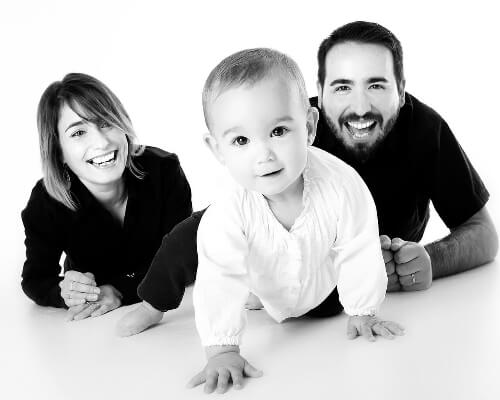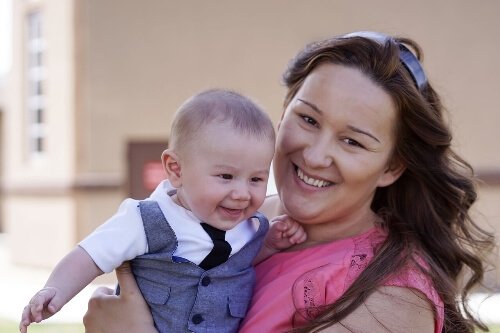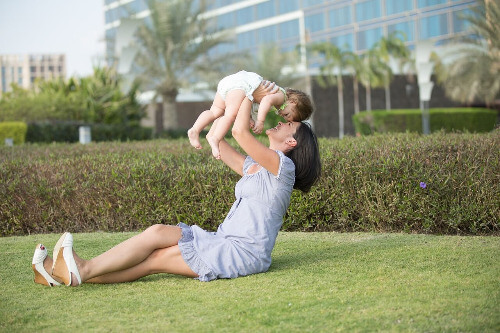Raising the Next Generation: The Characteristics of a Good Parent
It’s only natural to wonder about the characteristics of a good parent when you begin you're adventure towards parenthood.
When it comes to parenting there are certain qualities that will need to shine through to be effective.
 Mom, dad and baby are on the floor while on their stomachs and smiling.
Mom, dad and baby are on the floor while on their stomachs and smiling.Unconditional Love: The Foundation of Good Parenting
At the heart of the characteristics of a good parent lies unconditional love. Children need to feel secure, loved, and accepted just as they are.
As a parent, it’s essential to communicate that your love is not dependent on their achievements, behaviour, or success.
It doesn’t mean that you should not set boundaries or discipline them when necessary, but let them know that no matter what happens your love for them is forever.
Remember, don’t just express your love through words, but also actions such as physical affection or quality time spent together.
How can you show unconditional love?
- Spend quality time: Give your child your undivided attention during special moments. This could include spending quality time together. Ie. Reading, playing a game or just talking about their day.
- Active listening: When your child talks to you, listen with your full attention. Let them feel heard and valued.
- Celebrate their individuality: Every child has their own personality and behaviours. Recognizing their individuality will strengthen the bond you share.
Patience and Empathy: A Virtue in Parenting
Patience and empathy are necessary traits among the characteristics of a good parent.
Because kids are constantly learning and growing, it means that any mistakes they make or challenges they encounter are just a part of their journey through life.
Patient parents understand this and respond with calm guidance rather than frustration.
 Mom outdoors while holding baby and smiling.
Mom outdoors while holding baby and smiling.Similar to patience is empathy, children will need you during the times when they are going through emotional ups ad downs. Developing patience and empathy helps you connect more deeply with your child
How can you show patience and empathy?
- Pause before reacting: In moments of frustration, take a deep breath before responding to your child. Consider what it is you will say and respond calmly.
- Validate their feelings: Let your child know that it’s okay to feel upset, angry, or sad. This way you are helping them to learn how to manage their feeling.
- Teach by example: Demonstrate patience and empathy in your actions. Children often model their behaviour on what they observe.
Consistency: Setting Clear Expectations or Boundaries
Consistency in rules and expectations is another hallmark of good parenting. When you are consistent, children feel secure and understand boundaries or whatever it is that is expected of them.
As a good parent you know how to set reasonable rules and stick to them.
For example, if a rule is broken you are clear about the consequences giving kids the chance to learn and grow.
Why are boundaries important?
- Encourages responsibility: When children know the limits, they learn to take responsibility for their actions.
- Builds respect: Consistent rules create a respectful relationship where both parties understand each other’s roles.
- Fosters self-discipline: Children who grow up with boundaries develop better self-control and discipline as they age.
Effective Communication: The Key to Understanding
Good parents are excellent communicators. They listen actively to their children, they express themselves clearly, and they create an open dialogue. They foster trust and help their children feel valued and understood.
Tips for effective communication:
- Be approachable: Let your child know that they can come to you with anything. Make it clear that there are no off-limit topics.
- Be clear and concise: Children respond best to direct communication. Avoid overly complicated language and be clear in your instructions or feedback.
Additional Characteristics of a Good Parent
 Mom sitting on the grass, and is holding baby above her with foreheads touching one another.
Mom sitting on the grass, and is holding baby above her with foreheads touching one another.Flexibility: Adapting to Change
One of the many characteristics of a good parent that allows for growth and learning on both sides is being flexible.
You need to understand that as your child grows and circumstances evolve, your parenting style will need to change as well.
Responsibility and Accountability: Teaching Life Skills
Teaching responsibility and accountability are characteristics of a good parent that emphasizes that by admitting to your mistakes you are modelling accountability and showing your kids how you are learning from them.
Nurturing Independence: Fostering Growth
While it's natural to want to protect your children, you need to understand the importance of fostering independence.
It includes giving your children age-appropriate responsibilities and allowing them the freedom to make decisions.
Emotional Intelligence: Managing Feelings
Good parents help their children develop emotional intelligence, by helping them to understand and manage their emotions effectively.
Supportiveness: Celebrate Your Child's Dreams
Being supportive doesn’t necessarily mean agreeing with everything your child does, but rather encouraging their interests, celebrating their achievements, and being there during tough times.
Respect: Treating Children as Individuals
Respect children as individuals with their own thoughts, feelings, and preferences. By showing respect towards your children you are helping them to develop their self-worth and teaching them to respect others.
Stress Management: Maintaining Balance
Good parents recognize the importance of managing their own stress.
They understand that their emotional state affects their children and know when it is time for some much needed self-care in order to maintain a calm, positive atmosphere at home.
Continuous Learning: Growing Together
You are continually learning as a parent, remaining open to new information, willing to admit when you’re wrong, and always striving to improve. This growth mindset sets a powerful example for children.
Creating a Loving Home Environment
 Mom behind her son, giving him a hug and both smiling.
Mom behind her son, giving him a hug and both smiling.Perhaps one of the most significant characteristics of a good parent is the willingness to keep trying, even when things get tough. Your children will remember your love, your effort, and your presence far more than any individual parenting decision.




















New! Comments
Have your say about what you just read! Leave me a comment in the box below.